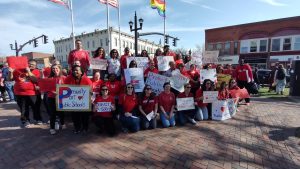Disabled Community Celebrates Resilience Through Performance
April 8, 2016
Healing from violence inflicted by systems of oppression is a major challenge faced by marginalized communities. On Tuesday, College seniors Rachel Parnell and Sylvie Rosenkalt created a space at the Cat in the Cream where such healing and restoration processes could begin and continue as part of the Healing Justice Lending Library Art Show and Fundraiser. Parnell carefully curated a playlist of videos of performances by disabled artists for the event, and Vines created by Rosenkalt were showcased on tables set up at the venue’s entrance. A group of eager students rearranged the space to make it more accessible for disabled people. Without a ramp for wheelchair users, organizers turned the stage into an elevated seating area, which freed up the floor for wheelchair accessibility.
Over the past two years, Rosenkalt has been working to increase access to resources for the College’s disabled community. She has found guidance in the philosophies of disability justice, which centers disability rights in an intersectional framework of social justice movements and healing justice, which revolves around understanding generational trauma — the idea that the effects of distress can influence future generations. With Parnell’s help, Rosenkalt’s most ambitious project yet, the Healing Justice Lending Library, will become a reality by the end of April. The library will be housed in the Peer Resource Center in Wilder 304 and will allow people to check out a variety of healing tools — from mobility devices to sensory tools like weighted blankets to heating pads and trauma kits — without having to worry about insurance or payment. The HJLL will also serve as a space to increase awareness of and about disability.
Disability justice and healing justice are both emerging movements. The founders of the disability justice movement were a group of disabled and chronically ill people who had participated in social justice movements that didn’t address disability, but did not feel at home in the disability rights movement due to racism, queerphobia and roots in capitalism. Their movement centers people at the intersections of multiple forms of oppression. Healing Justice takes the principles of disability justice and extends them to confront generational trauma.
The show at the fundraiser consisted of various performances by disabled artists, many of which were on YouTube and screened using a projector, with student performances toward the end. Rosenkalt explained that while people don’t often get together to watch YouTube videos, gathering to watch disabled artists can be a powerful experience.
Rosenkalt and Parnell prefaced the show by explaining that the purpose of the event was threefold: to get the word out about the Healing Justice Lending Library, to raise money for the library and to celebrate two years of hard work and resilience.
One YouTube video was Leah Lakshmi Piepzna-Samarasinha’s “Cripstory,” a galvanizing narrative poem about disability and resilience. “We don’t know what just keeping breathing as disabled folks will help us give birth to … all our sweet drooling broken beautiful ugly danger / a cosmos of crip story,” the poem reads. Two performances by Sins Invalid, a queer disabled performance art group, followed. In one video, a mummified dancer performed on a stage while acting as a canvas for beautiful neon projections. In another, an acrobat in a wheelchair suspended in midair by a tightrope made emphatic and explosive gestures which echoed the Haka, a traditional Maori war dance.
The student performances, however, were the highlights of the event. Rosenkalt read one of her favorite poems, “Patience” by Aurora Levins Morales. In a heartfelt performance, Rosenkalt made the poem her own. Emotion shone through the cracks in her voice, “Why do they call us ‘the patient’ / We are not patient. We endure.” Next came Review Production Editor Auden Granger, who performed a poem of their own titled “Letter to My Past Self,” a rhythmically conscious and emotionally dynamic piece. Tracing the ups and downs of life as they recited, Granger expounded powerful meditations on the messy and ungovernable nature of life. “Life isn’t a novel with introduction-rising-action-climax-falling-action-conclusion / it’s a mess of dips and dives and hills, some of them you can’t even see until you’ve passed them and some of them I can’t catch even now, and trying to characterize all of that as improving / or / declining / is a mistake you’re gonna make over and over again until finally it hits you in the face that things can be getting better / and also getting worse / all at the same time,” they read. Then came a black-and-white video recording of a spoken word poem by three members of OSLAM — College junior Nina Sahar, College sophomore Deborah Johnson and College junior Misaël Syldor — confronting cultural appropriation and intergenerational trauma and violence. Despite the gritty video, their performance was, as usual, spectacular.
As the night drew to a close, Rosenkalt and Parnell thanked everyone for coming and asked attendees to visit HJLL’s official Facebook page where they will soon be uploading resources for those wanting to educate themselves further. Amidst all the thoughts and feelings swirling about the room, it was evident that Rosenkalt and Parnell’s efforts were appreciated and a much-needed addition to the Oberlin community.


















